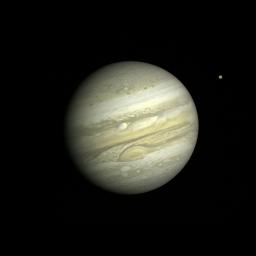
|
Jupiter with Satellite Io
- Click the image above for a larger view
- Full-Res JPEG (1000 x 1000) (37.3 kB)
- Full-Res TIFF (1000 x 1000) (1.2 MB)
Caption:
Voyager 1 took this photo of Jupiter Feb. 1, 1979, at a range of 20 million miles (32.7 million kilometers). Voyager scientists can now see that different colors in clouds around the Great Red Spot imply that the clouds swirl around the spot at varying altitudes. They also observe apparently regular spacing between the small white spots in the southern hemisphere and similar positioning of dark spots in the northern hemisphere. A major activity will be to understand the form and structure of the spots and how they may relate to interactions between the atmospheric composition and its motions. When scientists compare this image with the 6,000 others already taken, they see many changes both large and small. The bright cloud in the equatorial region north of the Great Red Spot, for example, appears to be where bright clouds originate, then stream westward. On the other hand, the bright ovals south of the Great Red Spot were seen to form about 40 years ago, and have remained much the same ever since. The Great Red Spot itself has been observed for hundreds of years though never in the detail seen here. Objects as small as 375 miles (600 kilometers across can be seen in this image. That resolution is the best achieved of Jupiter. This black-and-white photo was taken through blue filter.
Background Info:
The Voyager Project is managed for NASA's Office of Space Science by Jet Propulsion Laboratory.
Cataloging Keywords:
| Name | Value | Additional Values |
|---|---|---|
| Target | Jupiter | Io |
| System | Jupiter | |
| Target Type | Planet | Satellite |
| Mission | Voyager | |
| Instrument Host | Cassini Orbiter | Voyager 1 |
| Host Type | Orbiter | Flyby Spacecraft |
| Instrument | Imaging Science Subsystem (ISS) | |
| Detector | ||
| Extra Keywords | Atmosphere, Color, Storm | |
| Acquisition Date | ||
| Release Date | 1996-03-13 | |
| Date in Caption | 1979-02-01 | |
| Image Credit | NASA/JPL | |
| Source | photojournal.jpl.nasa.gov/catalog/PIA00235 | |
| Identifier | PIA00235 | |
